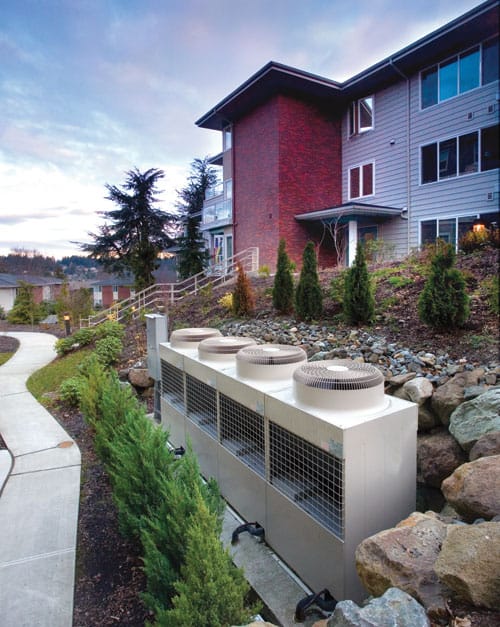Updated: The Secrets of VRF Systems: Discover the Surprising Benefits Today!
If you're in need of a new air conditioning system for your office space, consider exploring VRF systems. Don't assume that the office building will provide one for you—they often don't. There's a growing trend among building management to shift air conditioning and heating responsibilities to tenants, avoiding costly installations and potential future support. If you're given the choice for your space, opting for VRF (Variable Refrigerant Flow) systems can be a wise decision.

A newly installed Variable Refrigerant Flow (VRF) system. Find out what are the benefits
Here are just a few benefits of VRF systems:
- operational efficiency
- consistent comfort
- extremely quiet operation
- energy efficiency
- simultaneous heating and cooling
- zoning
- modern controls
- fewer breakdowns
One of the best benefits of VRF systems is they offer energy efficiency by supplying only the precise amount of refrigerant needed to cool or heat a room under a room’s current condition
Operational efficiency
Ensuring operational efficiency is crucial for both employee comfort and cost-effectiveness. VRF systems provide independent zone control, offering enhanced flexibility in regulating temperature and humidity levels while also conserving energy.
Consistent comfort
The outdoor condensing unit of VRF systems effectively discerns the heating or cooling requirements of individual comfort zones, delivering the exact quantity of refrigerant required to each indoor air handling unit. This precision in distribution minimizes fluctuations in temperature and humidity, ensuring a consistent level of comfort that contributes to enhanced productivity among employees.
Extremely quiet operation
The noise volume of outdoor units often correlates with neighbor complaints, potentially leading to disputes. VRF systems, however, operate quietly while maintaining their powerful functionality. Additionally, the smaller air handlers associated with VRF systems produce less noise compared to larger central units with visible ductwork. By minimizing indoor noise levels, VRF systems reduce the likelihood of business disruptions.
Energy efficiency
A key advantage of VRF systems is their energy efficiency, achieved by delivering precisely the required amount of refrigerant to cool or heat a room based on its current conditions. Consequently, these systems operate at lower capacities for a significant portion of the time. Moreover, VRF systems have the capability to capture heat while cooling one room and transfer it to other areas in the building that require heating, further enhancing their energy-saving capabilities.
Simultaneous heating and cooling
Another appealing feature of VRF systems is their ability to simultaneously provide heating and cooling. These systems efficiently capture heat during the cooling process and can redistribute it to areas requiring warmth. Given that different rooms often have varying heating and cooling requirements—such as cooler temperatures for computer rooms and increased cooling for offices with sun exposure—VRF systems intelligently allocate energy to meet immediate demands for heating or cooling.
Zoning
This capability is a significant advantage as it enables the attainment of an ideal climate in virtually any scenario. Whether it's conference rooms, hallways, offices, or lunchrooms, each space requires a tailored approach to heating and cooling. Unlike central air conditioning systems with cumbersome ductwork, VRF systems can effectively meet the diverse cooling and heating needs of individual rooms without the risk of them becoming excessively cold or hot.
Modern controls
The diverse controls offered by VRF systems provide numerous valuable benefits, such as the convenience of adjusting temperature settings in different zones using your mobile device. In commercial settings like offices or buildings, the utilization of building management software enables comprehensive control over all units within the premises. This integration of smart technology stands out as one of the system's most advantageous features. Additionally, in addition to supplying the precise amount of refrigerant to each indoor unit as needed, VRF systems also manage system operation and issue maintenance or repair notifications, ensuring optimal performance and longevity.
Fewer breakdowns
Undoubtedly, one of the significant advantages of VRF systems is their reduced frequency of breakdowns. It's evident that nobody wishes to endure a lack of air conditioning during scorching summer days or heating during winter. VRF systems are engineered to operate solely when required and under partial load conditions, resulting in fewer necessary repairs. This translates to cost savings and minimized downtime, providing enhanced reliability for uninterrupted comfort control.
Need new air conditioning system for your office space? Let's discuss which system will benefit your office space the most!
Back Home - Richair Comfort Solution - Ductless Mini Split Systems Top Quality Installations and Professional Service.
Was This Article Helpful?
RECENT POSTS

